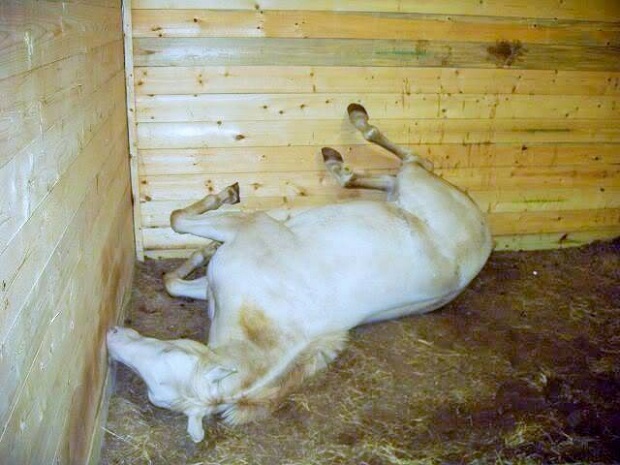
Your horse will roll. And in most cases, rolling is no cause for alarm. That is, unless he rolls in his own stall. If he does, he may become cast, a very dangerous position that could result in serious injury…unless you know what to do.
“Cast” is the term used to describe a horse that has rolled onto his back and wedged his legs against a hard barrier like a wall or a fence rail. He can’t stand up. He can’t right himself. And if he’s a vigorous roller, he could do significant damage to the joints in his legs. So, knowing how to handle this situation could save your horse a lot of pain…and you a hefty vet bill. If you’re horse is cast, you need to help him right himself as quickly and gently as possible.
If you’re lucky enough to have a fellow rider nearby, ask for their help immediately. Try to push the horse’s front legs away from the wall. If he can get two legs free, your horse can probably take it the rest of the way. However, you may find yourself alone with your cast horse. In that case, you’ll have to get a little creative. If your horse is small enough (or if you’re big enough), try to grab him by the mane and rotate him away from the wall. If that doesn’t work, you can loop a thick cotton lead rope under his chest and pull his front legs far enough away from the wall for him to right himself on his own.
If neither of these techniques works, you’ll have to try to roll the horse in the opposite direction of the wall he is cast against. I’ve spoken with many vets about rolling a cast horse. Some advise it, others say it’s too dangerous. Personally, I think you should only roll him as a last resort. Whenever you roll a horse, a lot of bad things can happen. You could twist his bowels, pull abdominal muscles, or even trigger a colic episode. If it’s my horse, I’ll roll him only if there’s no other option.
After your horse has gotten back up on his feet, he’ll probably still be somewhat agitated. Hitch your lead rope to his halter and take him for a walk to let him collect himself. Reassure him in a gentle voice that he’s fine and everything will be okay. There’s very little you can do to stop your horse from rolling. But if your horse casts himself, take the steps I’ve mentioned above. Knowing this helpful tidbit of horse care wisdom can mean the difference between a minor incident and a major injury.
Provided by Sierra Lynch, HorseIQ.com.
Related Articles & Free Email Newsletter
Debunking 6 Common Horse Myths
Foods That Are Not Safe or Good for a Horse



Comment here